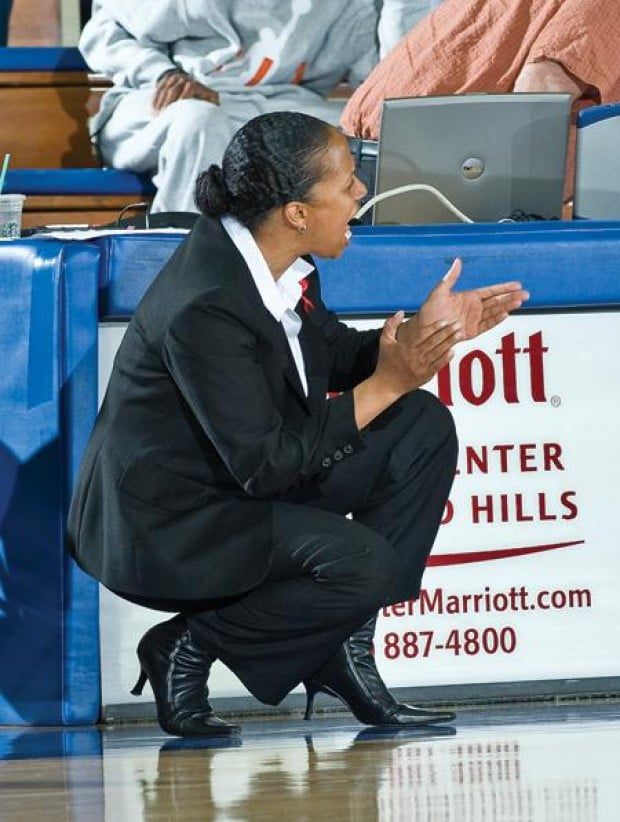
This profile on Pepperdine University women’s basketball coach Julie Rousseau is one in a series on individuals in the community who are involved with the world of sports.
Pepperdine University women’s basketball coach Julie Rousseau’s career path has been anything but ordinary. Rousseau made the rare jump from coaching in high school to the professional level when she became the head coach of the WNBA’s Los Angeles Sparks in 1997 at 31 years of age. She then became an assistant coach at Stanford University before assuming the head coaching position at Pepperdine in 2004. Rousseau took the Waves to the NCAA Tournament faster than any women’s basketball coach in school history. Additionally, in an effort to set an example for her players on how to balance basketball and school work, Rousseau undertook the ambitious task of working on her master’s degree in psychology while being a Division 1 head coach.
Recently, Rousseau returned from Belgrade, Serbia, where she was an assistant coach for the USA women’s basketball team in the World University Games. The squad won the gold medal by defeating Russia, 83-64.
What was it like getting to represent your country by coaching the USA in the World University Games in Serbia?
I was truly taken aback. To be representing your entire country, not just your university … I do not think I have ever tapped into the patriotism I felt when I got there. There are not a lot of countries that support us, and you develop this strong desire not to let your country down.
How is the United States squad treated in international competitions?
Serbia did an amazing job of hosting. The opening ceremony was like a parade, and people were lined up by the thousands cheering. But when the flags came out, we were booed. That experience fueled our passion and desire to represent our country, and to win… Everywhere we went we were protected by several officers. We never felt we were in danger, but we always knew we had protection.
What did you learn that will help you improve as a coach?
[Coaches Charli Turner Thorne and Suzy Merchant] and I shared an apartment room, and we talked basketball. We were scouting and getting prepared for the next opponent. Just seeing how other coaches approach the game helps, and you put that knowledge into your “coaching bag.”
Which players particularly impressed you?
There were games where each player had a special game. Each one of them played a huge part in the success of this team. We preached defense and rebounding, and that was the difference for us… [University of Connecticut’s] Maya Moore was not able to play with us because she sprained her knee, but she was the best cheerleader for our team. It showed a lot of character. She is a special talent, and a special person as well.
What types of experiences did the team have off the court in Serbia?
We found this amazing restaurant. They had Serbian music, and our kids started to dance with the people in the restaurant. Those were the experiences I will never forget. They are good-will experiences, and hopefully those people will think Americans are not that bad after all.
How will this experience help recruiting and building Pepperdine’s program?
It helps to coach the best players in the country, and to win the gold. I know that this was a United States event, but Pepperdine was there too. I hope that this helps recruiting, but also our current student-athletes. They were proud of me, and they know that this made me a better coach.
At Pepperdine, you have your players participate in a “Big Sister” clinic, and you founded the Timeout 4 HIV/AIDS Tournament. Why is it a priority to you that your players are good human beings off the court?
Pepperdine is a Christian school, and that is what drew me here. We want our players to be young women who can go out and make contributions to our society. Our lives are blessed so we can be a blessing to someone else.
This is your sixth season at Pepperdine. How has the program changed in that time?
Every year is different. I know we have gotten better, and I have gotten better as a leader. I have learned so much being here, what works and what does not. I believe we have turned a corner, and are headed in a direction that I always envisioned. We have had some success, but consistent success has alluded us. I think we can capture that.
What are your goals for the upcoming season?
To win. The focus for our program this year is excellence, whether it be in the classroom, the weight room, practice or your social life. You have to be prepared to win the race. Winning becomes the byproduct of putting yourself in the position to win. We are a very young team, but we are talented.